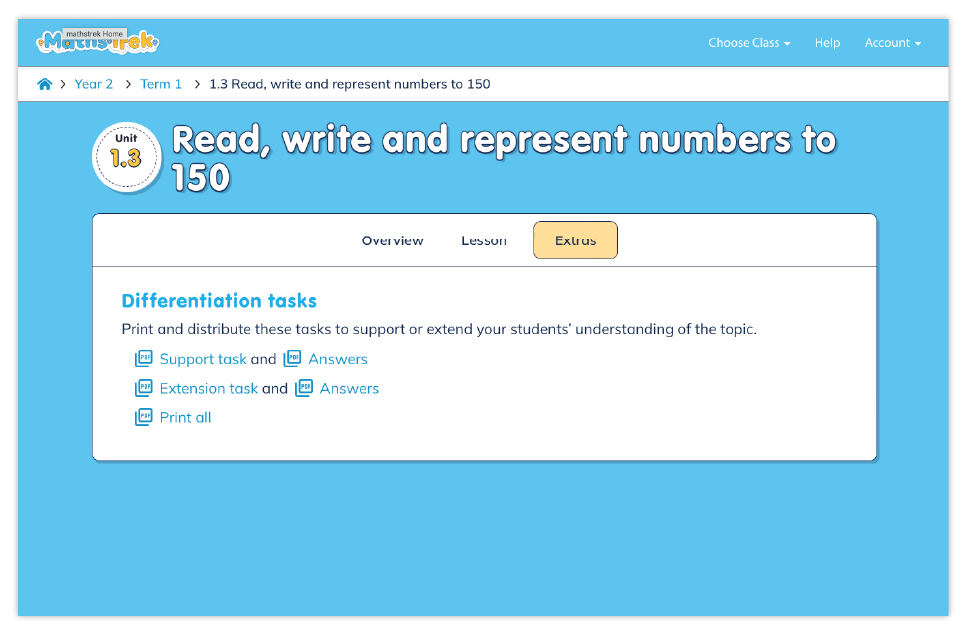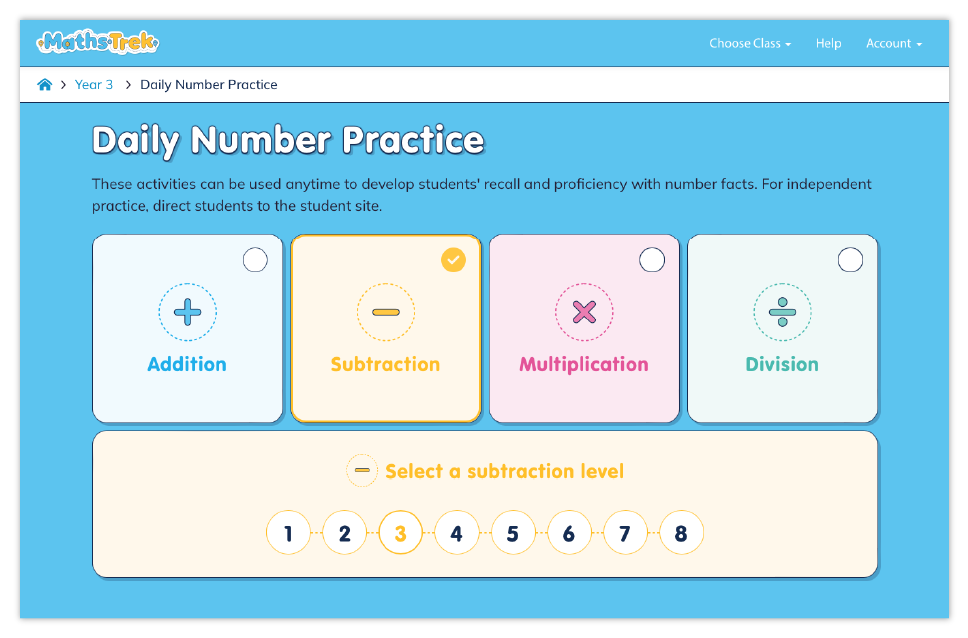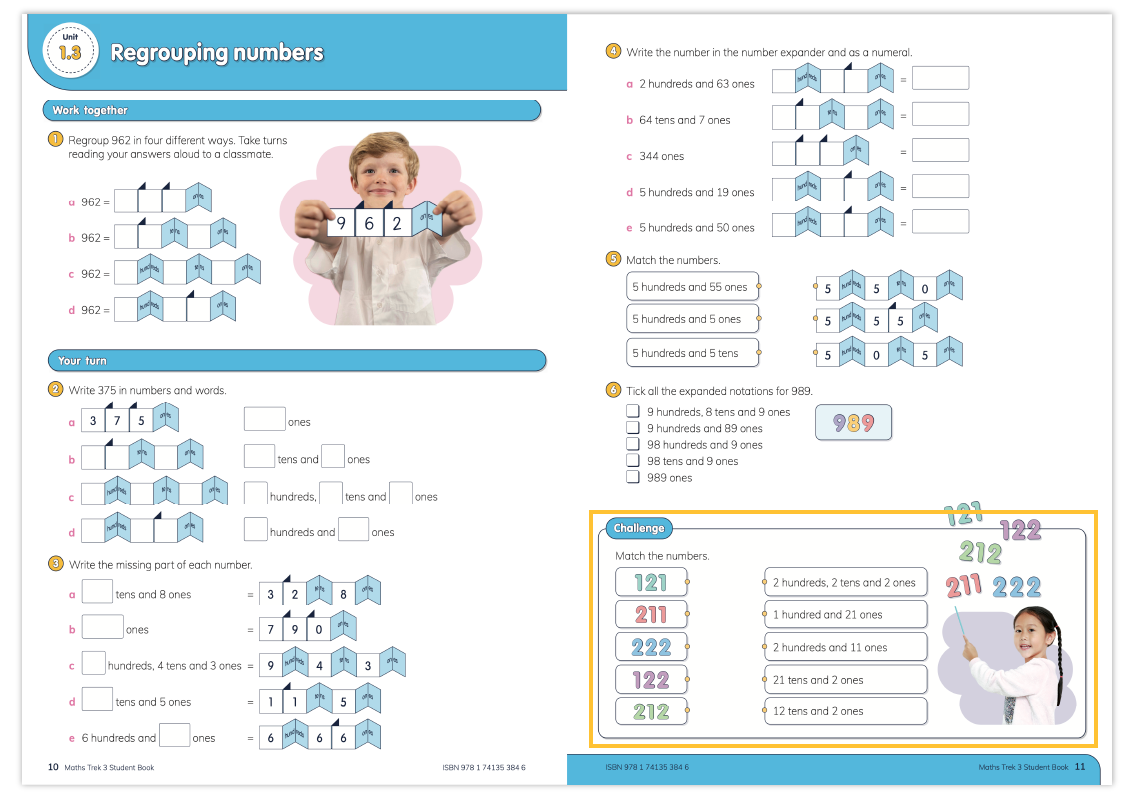Articles & Videos
How Maths Trek can help with differentiation
Categories
Subscribe to our newsletters
Receive teaching resources and tips, exclusive special offers, useful product information and more!
How Maths Trek can help with differentiation
Maths Trek 19/8/24

Every classroom needs some level of differentiated instruction. Students come with diverse language and cultural backgrounds, varying learning needs, different skill sets and a range of readiness levels for learning new concepts. Differentiated instruction requires teachers to take into account all these variables. Teachers must meet students at their point of need, engage and motivate students, and help them progress their learning.1
Effective differentiation is considered a high impact teaching strategy and involves making adjustments to the:
- content – What do I want each student to learn?
- process – How will I present this concept to optimise learning?
- product – How will students demonstrate their understanding?
- learning environment – How will the physical space support different learning styles? 2 3
Maths Trek includes a range of features and resources that help teachers provide effective differentiated instruction. Let’s unpack some of the ways to cater to varying needs in your maths lessons.
Lesson format
Maths Trek follows the Gradual Release of Responsibility model 3 and provides you with carefully structured lesson guides and interactive slideshows to explicitly teach topics and problem-solving. Lessons include opportunities for you to check your students’ understanding and culminate in independent practice where students consolidate their knowledge using the Student Book activities.
This structured I do, We do, You do lesson format provides a solid starting point for all students in your class. It steps students through each maths concept and allows you to easily to identify which students have grasped the concept and which students need additional support.
Differentiation tasks
The clue is in the name with this Maths Trek feature! All Maths Trek topics include a set of differentiation tasks to support and extend your students as required.
Foundation includes Consolidation tasks to reinforce topic concepts and Extension tasks for more capable students. Years 1 to 6 include Support tasks to assist students who struggle with topic concepts and Extension tasks to keep fast finishers engaged with higher-order thinking activities.
Find the printable differentiation tasks and answers in the Extras section of any topic at Maths Trek Online.

Assessments
Regular assessment helps you keep track of student understanding so you can course correct and plan ahead for targeted differentiation. In Maths Trek, ready-made assessments are administered termly for Years 1–6, and each semester for Foundation. These allow you to identify if students are performing at, below or above level.
Maths Trek’s formal opportunities for progress monitoring help you identify which students are excelling and require an extra challenge, and which students may require additional support.
Investigations
In Maths Trek students apply their understanding of the topics through a range of fun, motivating and real-world contexts with investigations. Investigations lend themselves beautifully to differentiation as they often require students to collaborate in small groups. You can choose to set same-ability groups where you work closely with the lower-ability groups who benefit from more guidance, while the higher-ability groups work independently. Or you may choose to set different-ability groups to facilitate a peer learning experience. With this approach, higher-ability students can help guide lower-ability students through the steps of the investigation. With up to four investigations in each year level, why not try both approaches to setting your groups?
You can find further differentiation opportunities in the final Share and discuss results step of all Foundation to Year 6 investigations. This teacher-led discussion allows you to identify students’ critical thinking skills and supply additional support where needed. You can also prompt your more capable students to tackle the higher order Inquiry question included at the end of all Years 3–6 investigations.
Problem-solving strategies
Years 1–6 include problem-solving strategy and practice activities. You will introduce students to a range of problem-solving strategies paired with targeted Your turn practice questions. After using the lesson slides to unpack an example problem as a class, you will prompt your students to complete the corresponding activities in the Student Book. With two to three activities per strategy that increase in difficulty, you can direct your more capable students to complete all problems or just the final problem. Meanwhile you can work with your lower-ability students to attempt just the first problem in the set.
Daily Number Practice
Daily Number Practice is a carefully sequenced interactive resource designed to help students develop recall and proficiency with number facts. Students independently complete sets of questions based on the four operations – addition, subtraction, multiplication and division. Each operation includes eight levels of progression and unique questions are generated every time a student starts a new set.
With the variety of operations and levels of progression, it’s easy to differentiate and direct students to complete activities best suited to their ability. Daily Number Practice is also a great option for your fast finishers to hop onto while the rest of the class finishes their lesson work.

Topic Challenges
Challenge activities are introduced in the Year 2 Student Book and continue right through to Year 6. These are short, engaging activities designed to extend student thinking and encourage students to apply their understanding of the topic at a higher level. These are perfect for fast finishers too!

It’s clear that Maths Trek is brimming with resources to help you as the teacher identify your students’ abilities and understanding. There is a wealth of scaffolded lesson materials and worked examples to help you support your struggling students, and lots of ready-made resources to extend your more capable students.
To explore some of these features first-hand, sign up for a free trial of Maths Trek Online. Or contact your local education consultant to book free professional learning for your school so you can unpack the features of Maths Trek in more detail.
References
Subban, PK & Round, PN 2015, ‘Differentiated instruction at work. Reinforcing the art of classroom observation through the creation of a checklist for beginning and pre-service teachers’, Australian Journal of Teacher Education, vol.40, no.5, pp.117–131, viewed 31 July 2024, https://doi.org/10.14221/ajte.2015v40n5.7↩
Lockhart, S 2024, High impact teaching strategies in action: Differentiated teaching, viewed 31 July 2024, https://www.schools.vic.gov.au/high-impact-teaching-strategies-action-differentiated-teaching#differentiated-teaching-explained-adjusting-content-process-and-product↩
Department of Education and Training Victoria 2024, Excellence in differentiation to increase student engagement and learning outcomes, Professional Practice Note 16, viewed 31 July 2024, https://www.education.vic.gov.au/Documents/school/teachers/teachingresources/practice/professionalpracticenote16.pdf↩